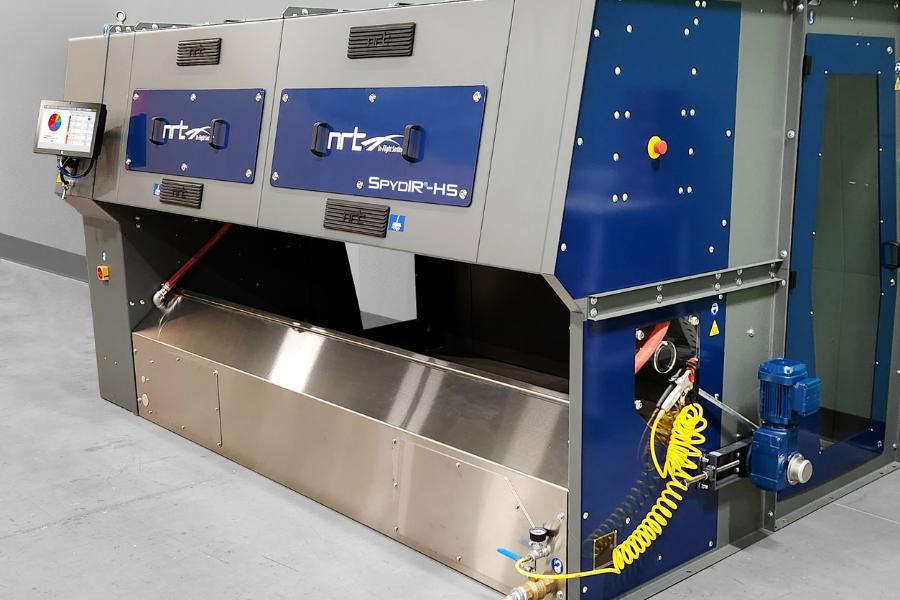
Advancements in AI and sorting tech are allowing MRFs to capture materials more efficiently. | Courtesy of Bulk Handling Systems
AMP Robotics, MSS and National Recovery Technologies are rolling out updates to AI algorithms, optical sorters and other sorting technologies.
Here’s a roundup of some recent equipment and technology announcements.
AI upgrades
AMP Robotics rolled out a more compact version of its AI-enabled automated sortation system and more advanced algorithms for better robotic recovery performance.
It is also offering a comprehensive facility design, build and operation service for single-stream and secondary feedstocks.
“For nearly three years, AMP has been actively testing the capabilities of AI and automation to direct facility design, with a focus on dramatically lowering the cost of recycling while maximizing yields in terms of both recovery and quality,” a press release stated.
The AMP Cortex-C is a compact version of AMP’s standard AI-guided robotics system. It has a small footprint and is straightforward to install, the press release noted, and can adapt to an array of conveyor belt sizes, angles and configurations. It also shares parts and components with the standard Cortex system.
The company is also rolling out updated AI Advanced Targeting algorithms that use machine learning to determine the best grip area for each item, the press release added, based on the object’s condition and material features. The robots can then learn to avoid creases, holes and other difficult-to-grasp locations. The software update is available for all Cortex and Cortex-C units.
Optical sorting advancements
Two companies, MSS and National Recovery Technologies (NRT), announced updates in the world of optical sorting.
U.S.-based optical sorting equipment manufacturer MSS and British technology company Recycleye combined their strengths to offer MSS Vivid (Visually Verified Identification) AI.
Using Recycleye’s AI technology and MSS’s air ejection system, MSS Vivid can handle higher belt speeds, process more volume and eject side-by-side materials on the belt without the limitations of a mechanical effector, a press release stated.
“MSS Vivid AI combines the reliable rapid-sorting air jets the company is known for with the granular real-time data provided by AI that plant managers need to drive efficiency and profitability in their MRF,” the press release noted.
The AI can also detect black plastics and differences in object color, shape and texture, allowing it to differentiate between UBCs and non-UBC aluminum, PET thermoforms and bottles, and food-grade and non-food grade plastics.
MSS Vivid AI will be available in the summer of 2023.
NRT also launched the SpydIR-HS optical sorter, a near-infrared platform with a hyper-spectral imaging camera, higher air ejection precision and the option of integration with the Max-AI visual identification system.
The company offers lifetime calibration and an updated access design for improved maintenance and safety. That design will now be available on all NRT optical sorters, a press release noted.
The SpydrIR-HS doesn’t require routine or auto calibration, unlike earlier models, according to the press release. When combined with the Max-AI visual identification system, the sorter can be highly targeted, sorting PET trays from a mixed PET material stream or HDPE-N containers from a mixed HDPE stream.
Thomas Brooks, chief technology officer for Bulk Handling Systems, NRT’s parent company, said the latest iteration of the optical sorter is “a culmination of years of research and development focused on improving detection while retaining NRT’s unique technology.”
New shredder manufacturing location
German-based industrial shredding equipment manufacturer Vecoplan is building a $6.75 million facility in High Point, N.C.
The company opened its North American headquarters in North Carolina in 2000. A press release noted the new facility will help Vecoplan meet demand for mobile shredding trucks, waste collection trucks and other recycling and sorting equipment and components.
The project received a performance-based grant of $75,000 from the One North Carolina Fund, contingent on the company hitting its job creation and capital investment targets.